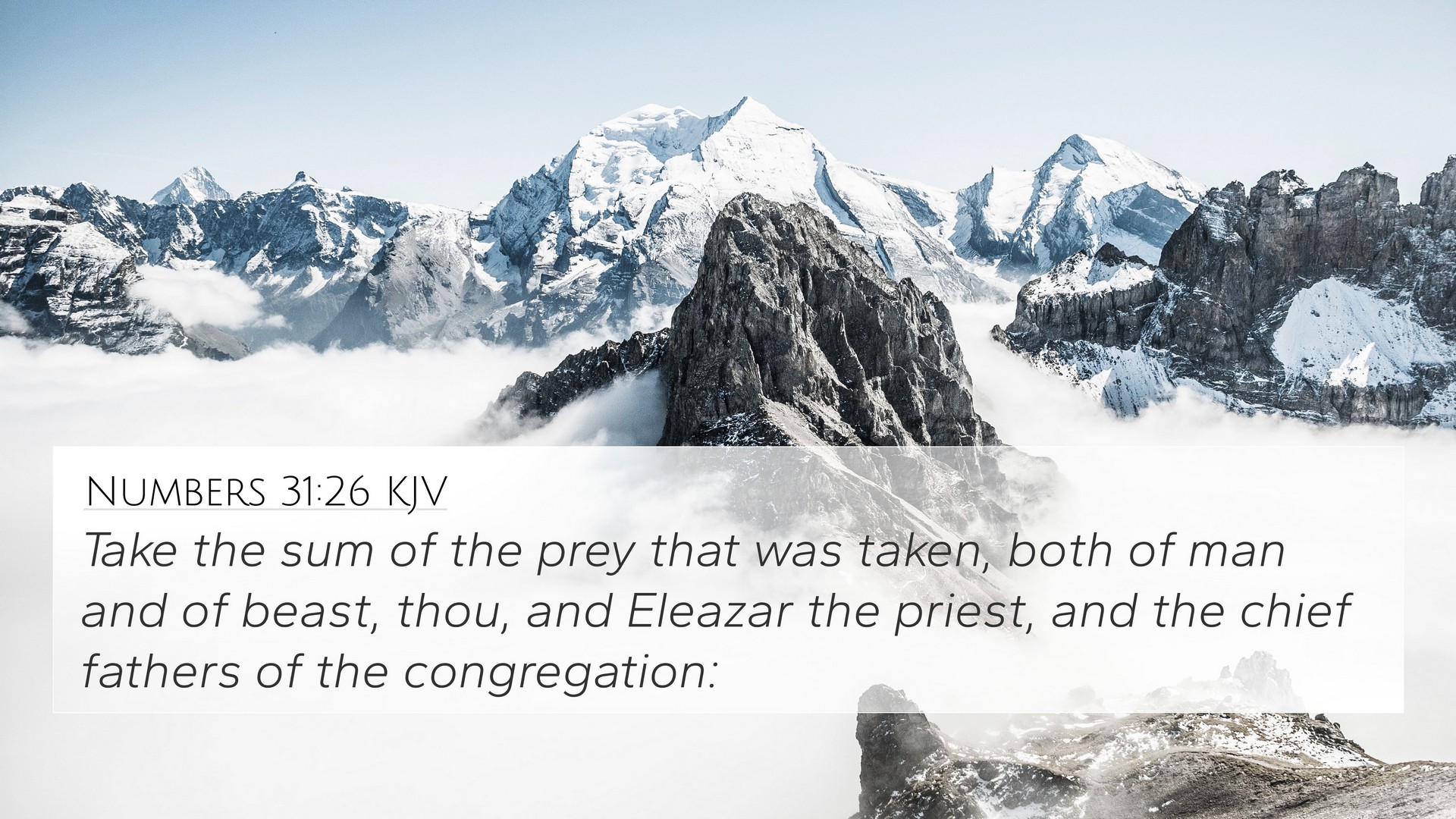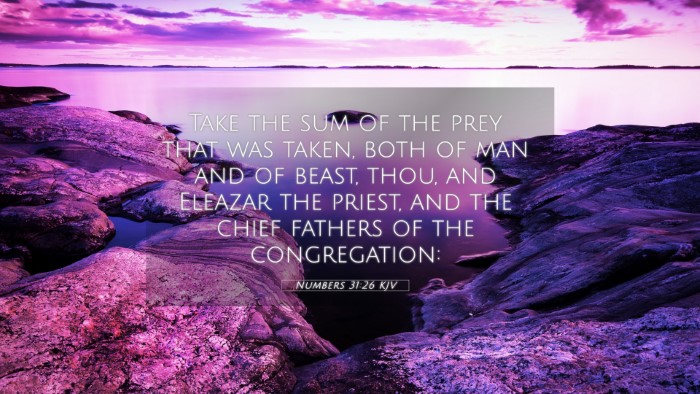Understanding Numbers 31:26
The verse Numbers 31:26 states:
"Take the count of the plunder that was taken, both of man and of beast, you and Eleazar the priest and the heads of the fathers' houses of the congregation." (Numbers 31:26, ESV)
This command, given by the Lord to Moses after the Israelite victory over the Midianites, highlights important themes of accountability, the stewardship of resources, and the significance of priestly roles in the community. Below, we explore the deeper meanings of this verse synthesized from multiple public domain commentaries.
Key Themes and Insights
-
Accountability to God:
Moses is instructed to take a census of the spoils of war, emphasizing that the people are accountable for what they have taken (Matthew Henry). This reflects the broader biblical principle that all we possess ultimately belongs to God and we are stewards of His provisions.
-
Role of the Priesthood:
Eleazar's involvement signifies the important role of the priesthood in mediating between God and the people, as well as overseeing the handling of sacred matters, including possessions taken in battle (Adam Clarke). The priest's duties often extended beyond spiritual oversight to practical governance of the community.
-
Community Participation:
The mention of "the heads of the fathers’ houses" indicates that this was a collective effort involving leadership within the congregation, highlighting the communal nature of worship and governance among the Israelites (Albert Barnes).
-
Divine Justice:
The necessity of counting the spoils reflects God's justice, ensuring that the spoils were properly accounted for and distributed. This mirrors the divine oversight of human affairs where every action is recorded and judged (Matthew Henry).
-
Symbolism of Plunder:
The act of taking plunder symbolizes both victory and divine blessing. The plunder in this context was seen as the reward for obedience to God’s commands and His blessing on the Israelites (Adam Clarke).
Bible Verse Cross-References
In order to grasp the full theological and historical implications of Numbers 31:26, we can link it with several other Bible verses:
- Exodus 30:12: Discusses the census and the requirement for atonement, emphasizing the seriousness of counting the people of Israel.
- Deuteronomy 20:14: Outlines how the spoils of war were to be dealt with, reflecting God's laws on warfare and possession.
- 1 Chronicles 21:1-2: Highlights the importance of counting the fighting men, a theme echoed in Numbers.
- Joshua 7:11: Describes the consequences of not handling the spoils as prescribed by God, reinforcing the principle of divine judgment on disobedience.
- Leviticus 7:30-34: Relates to the offerings made from the spoils of war and the sharing of these with the Levites, indicating God’s provision for His ministers.
- Matthew 6:19-21: Teaches about storing treasures in heaven rather than on earth, connecting with our stewardship of earthly possessions.
- Romans 14:12: States that each of us will give an account to God, paralleling the accountability theme seen in Numbers 31.
Connections Between Bible Verses
The act of counting the plunder serves as a practical application of God’s laws and serves to reinforce community ethics and spiritual accountability. The thematic connections help facilitate a better understanding of both Old Testament teachings as well as their New Testament fulfillment. We see that:
- Both Leviticus and Deuteronomy provide commandments regarding possession and rights of the priests, establishing a continuity in the understanding of divine instruction.
- In the New Testament, families and communities are also called to accountability, demonstrating a consistent biblical thread about stewardship (Romans 14:12).
Thematic Bible Verse Connections
Understanding this verse encourages deeper study into how themes of responsibility, authority, and divine order permeate the Scriptures:
- Stewardship of God’s gifts, drawing from 1 Peter 4:10 which calls believers to use their gifts for the good of others.
- The interplay between God's justice and human accountability can be cross-referenced with Luke 12:48 which articulates the principle that those given much will be required to give an account.
Conclusion
The verse Numbers 31:26, while contextual to the Israelites' situation, remains profoundly relevant, illustrating themes that resonate throughout scripture. Through comparative analysis and cross-referencing biblical texts, we see a cohesive narrative of accountability, the role of leadership, and God's continuous guidance in moral stewardship. To fully engage with scripture, immersing oneself in these connections strengthens understanding, facilitates deeper study, and reveals the richness of biblical truths.


